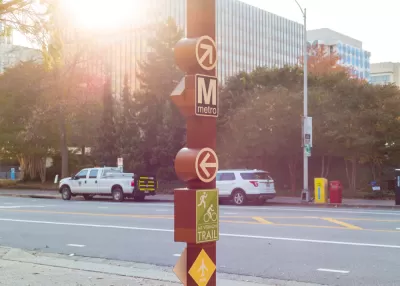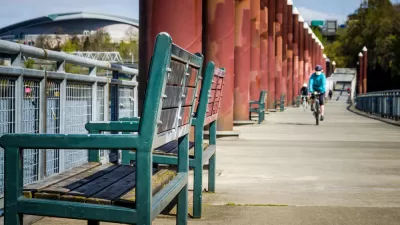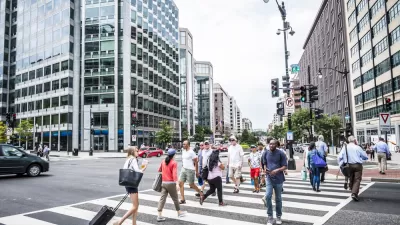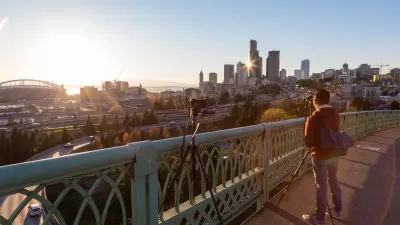Evidence from Arlington, Virginia.

Kea Wilson provides insight into a study published this week by the Insurance Institute for Highway Safety, finding evidence that the bike paths of Arlington,. Virginia saved lives during the pandemic.
According to Wilson's explanation of the study, the findings show that communities who prioritized the construction of protected bike paths saved the most lives during the pandemic and its resulting bike boom (both of which are still ongoing), "and would have done so with or without the virus."
The study found that Arlington’s pre-COVID investments into active transportation paid off big during the pandemic. As national cycling fatalities climbed 5 percent between 2019 and 2020 — a phenomenon that experts attribute, in part, to a 16-percent jump in cycling journeys on U.S. roads over that period — Arlington had zero deaths, and the rate of injury-causing collisions between cyclists and drivers plummeted 28 percent compared to the average from the previous six years. (Total cycling journeys in the already-bikier-than-average city, meanwhile, increased about 4 percent.)
As noted by Wilson, Arlington is a model of a suburban environment that has committed to bike infrastructure—unlike most similarly sized and situated communities around the country.
Widely regarded as the most bicycle-friendly county in the region, the D.C. suburb is home to more than 50 miles of paved, off-road trails, in addition to 37 miles of on-road lanes — which means that its cyclists had more options to keep themselves safe when drivers began to speed up on lockdown-emptied roads.
More insight into the nuances of the study's findings and its implications for other communities are found in the source article.
FULL STORY: Study: Protected Bike Paths Saved Lives During COVID

Alabama: Trump Terminates Settlements for Black Communities Harmed By Raw Sewage
Trump deemed the landmark civil rights agreement “illegal DEI and environmental justice policy.”

Study: Maui’s Plan to Convert Vacation Rentals to Long-Term Housing Could Cause Nearly $1 Billion Economic Loss
The plan would reduce visitor accommodation by 25% resulting in 1,900 jobs lost.

Planetizen Federal Action Tracker
A weekly monitor of how Trump’s orders and actions are impacting planners and planning in America.

Waymo Gets Permission to Map SF’s Market Street
If allowed to operate on the traffic-restricted street, Waymo’s autonomous taxis would have a leg up over ride-hailing competitors — and counter the city’s efforts to grow bike and pedestrian on the thoroughfare.

Parklet Symposium Highlights the Success of Shared Spaces
Parklets got a boost during the Covid-19 pandemic, when the concept was translated to outdoor dining programs that offered restaurants a lifeline during the shutdown.

Federal Homelessness Agency Places Entire Staff on Leave
The U.S. Interagency Council on Homelessness is the only federal agency dedicated to preventing and ending homelessness.
Urban Design for Planners 1: Software Tools
This six-course series explores essential urban design concepts using open source software and equips planners with the tools they need to participate fully in the urban design process.
Planning for Universal Design
Learn the tools for implementing Universal Design in planning regulations.
Caltrans
Smith Gee Studio
Institute for Housing and Urban Development Studies (IHS)
City of Grandview
Harvard GSD Executive Education
Toledo-Lucas County Plan Commissions
Salt Lake City
NYU Wagner Graduate School of Public Service





























